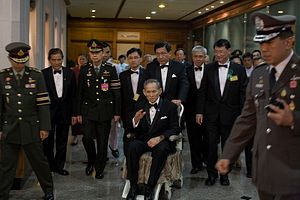Thailand’s citizens have tolerated autocratic junta rule for more than two years now as the nation increasingly hunkers down in the fears that their ailing king, a symbol of national unity, may soon expire. But when the revered king inevitably passes away, Thailand’s citizens may question – and indeed lose patience with – the prevailing dictatorship in Bangkok.
On Sunday, the Thai palace announced that King Bhumibol Adulyadej was in an unstable condition and receiving care in Bangkok’s Siriraj Hospital, where 300 people had gathered in support. It also emerged that the king had been placed on a ventilator and that doctors suggested the king suspend his remaining royal duties while they try to stabilize his health – perhaps paving the way for a contentious royal succession.
Though the government of Prime Minister Prayuth Chan-ocha has expressed caution and urged people not believe rumors, Thai people have been anxious for decades considering the king’s weak health. The king has previously been treated for respiratory ailments and blood infections and has been in more or less continuous hospital care since 2009.
National malaise has infused Thailand’s zero-sum political polarization, boiling over into recurring protests and coups from 2006-2014. Since the National Council for Peace and Order (NCPO) took power in May 2014, Thailand’s rulers have cracked down increasingly harshly on any public remarks surrounding the throne, doling out disproportionately long sentences for seemingly minor offenses, often verging on the absurd.
Political instability has also negatively impacted the Thai economy, which has been stagnating since the May 2014 coup. The latest reports of the king’s deteriorating health caused the country’s stock exchange to contract by 6.9 percent on Wednesday.
In the wake of the king’s imminent departure from the throne, there are a series of possible succession scenarios. The most likely, according to most political analysts, appears to be the anointment of Crown Prince Vajiralongkorn, the only male heir. However, the crown prince lacks the moral standing to unify Thai people and has often been ridiculed for his abrasive behavior.
Although Prince Vajiralongkorn reportedly has cultivated the support of PM Prayuth and the Royal Thai Army in an effort to cement his ascension to the throne, the military remains divided. Members of the Queen’s Guard, loyal to Queen Sirikit, may challenge that succession strategy engineered by the conservative royalists aligned with Bhumibol and Vajiralongkorn.
On top of that, many still consider the crown prince allied with ousted Red Shirt leader, former PM Thaksin Shinawatra, the brother of Yingluck Shinawtra, deposed from the PM seat in the lead-up to the 2014 coup. The NCPO took power with the overriding objective of barring the Shinawatra clan, which has won every election since 2001, from political power.
Ultra royalists led by the former dictator Prem Tinsulanonda, president of the Privy Council and a figure long-trusted by Bhumibol, have vowed to back Princess Sirindhorn as heiress to the throne. Though unprecedented in Thai history, the would-be queen is widely popular for her charity projects and charming public persona.
The 2016 constitution, recently approved in a controversial referendum, enshrines the ability of the Privy Council, a royalist cadre, to take power pro tempore in the event of a royal succession. It will then work with the current NCPO leadership of PM Prayuth to steer the succession process – unless a power struggle ensues pitting the princess’ backers versus those of the crown prince, in which case all bets are off. Whatever the result, we are likely to see protracted political instability.
All of this portends extremely dangerous days ahead for Thailand. The nation’s Red Shirt-Yellow Shirt divide, pitting largely northern, rural voters against southern, urban Thais, will reemerge in the public sphere and can only deepen. This societal rift has the potential to lead to violent street clashes as it did in 2006, 2008, 2010, and again leading up to the coup in 2014.
In this case, the military (or one faction of it, at least) would almost certainly step in and clamp down. Thailand could experience bloodshed as hasn’t been witnessed since the Thammasat University massacre of 1976, which saw the military massacre nearly 100 student protesters, wounding and jailing many more, with allegations of rape and torture.
The Thai king has been the primary unifying figure in Thai politics for the last half-century. Whichever way the royal succession unfolds, Thai citizens are unlikely to remain patient with the currently reigning junta, which has shown its ineptitude at economic and political management and barely managed to keep a lid on widespread public dissent with its proclivity for violent suppression. The one thing we can safely bet on in Thai politics is that we’re in for surprise.
Hunter Marston is an independent, Washington, DC-based Southeast Asia analyst. Follow him on Twitter at @hmarston4.

































